The 2nd Conference of the Workers' Party of Korea was held in Pyongyang in October 1966. At the time the domestic and international situation of the Korean Workers' Party was complicated by the Sino-Soviet split, which had caused a rift among communist countries and parties. Kim Il Sung delivered the report The Present Situation and the Tasks of Our Party which emphasized unity between socialist countries and within the international communist movement, as well as directing the main blow to United States imperialism, particularly with regards to the Vietnam War. He also emphasized the need for "politico-ideological unity of the revolutionary ranks". [1] [ third-party source needed ]
Following the conference, a group called the "Kapsan faction" started voicing opinions critical of Kim Il Sung. The internal differences within the party culminated to a purge called the Kapsan Faction Incident that left Kim Il Sung's rule unchallenged. [2]

Juche, officially the Juche idea, is the state ideology of North Korea and the official ideology of the Workers' Party of Korea. North Korean sources attribute its conceptualization to Kim Il Sung, the country's founder and first leader. Juche was originally regarded as a variant of Marxism–Leninism until Kim Jong Il, Kim Il Sung's son and successor, declared it a distinct ideology in the 1970s. Kim Jong Il further developed Juche in the 1980s and 1990s by making ideological breaks from Marxism–Leninism and increasing the importance of his father's ideas.

Songun is the "military-first" policy of North Korea, prioritizing the Korean People's Army in the affairs of state and allocation of resources. "Military-first" as a principle guides political and economic life in North Korea, with "military-first politics" dominating the political system; "a line of military-first economic construction" acting as an economic system; and "military-first ideology" serving as the guiding ideology.

The Workers' Party of North Korea was a communist party in North Korea from 1946 to 1949 and was a predecessor of the current Workers' Party of Korea. It was founded at a congress on 28–30 August 1946, by the merger of the northern branch of the Communist Party of Korea and the New People's Party of Korea. Kim Tu-bong, the leader of the New People's Party, was elected chairman of the party, while Chu Yong-ha and Kim Il Sung were elected as vice chairmen. At the time of establishment, the party is believed to have had about 366,000 members organized in around 12,000 party cells.
The Communist movement in Korea emerged as a political movement in the early 20th century. Although the movement had a minor role in pre-war politics, the division between the communist North Korea and the anti-communist South Korea came to dominate Korean political life in the post-World War II era. North Korea, officially the Democratic People's Republic of Korea, continues to be a Jucheist state under the rule of the Workers' Party of Korea. In South Korea, the National Security Law has been used to criminalize advocacy of communism and groups suspected of alignment with North Korea. Due to the end of economic aid from the Soviet Union after its dissolution in 1991, due to the impractical ideological application of Stalinist policies in North Korea over years of economic slowdown in the 1980s and receding during the 1990s, North Korea continues to nominally uphold Communism, but has replaced Marxism-Leninism with the Juche idea. References to Communism were removed in the North Korean 1992 and 1998 constitutional revisions to make way for the personality cult of Kim's family dictatorship and the North Korean market economy reform. The Workers' Party of Korea under the leadership of Kim Jong Un later reconfirmed commitment to the establishment of a communist society, but orthodox Marxism has since been largely tabled in favor of "Socialism in our style". Officially, the DPRK still retains a command economy with complete state control of industry and agriculture. North Korea maintains collectivized farms and state-funded education and healthcare.

The Workers' Party of Korea (WPK) is the sole ruling party of the Democratic People's Republic of Korea, commonly known as North Korea. Founded in 1949 from the merger of the Workers' Party of North Korea and the Workers' Party of South Korea, the WPK is the oldest active party in Korea. It also controls the Korean People's Army, North Korea's armed forces. The WPK is the largest party represented in the Supreme People's Assembly and coexists with two other legal parties making up the Democratic Front for the Reunification of Korea. However, these minor parties are completely subservient to the WPK and must accept the WPK's "leading role" as a condition of their existence. The WPK is banned in the Republic of Korea under the National Security Act and is sanctioned by the United Nations, the European Union, Australia, and the United States.

The Chollima Movement was a state-sponsored Stakhanovite movement in North Korea intended to promote rapid economic development. Launched in 1956 or 1958, the movement emphasized "ideological incentives to work harder" and the personal guidance of Kim Il Sung rather than rational modes of economic management.

The 6th Congress of the Workers' Party of Korea (WPK) was held in the February 8 House of Culture in Pyongyang, North Korea, from 10 to 14 October 1980. The congress is the highest organ of the party, and is stipulated to be held every four years. 3,062 delegates represented the party's membership; 117 foreign delegates attended the congress, without the right to speak. The congress saw the reappointment of Kim Il Sung as WPK General Secretary and the Presidium of the Politburo established as the highest organ of the party between congresses.
The August Faction Incident, officially called the "Second Arduous March", was an attempted removal of Kim Il Sung from power by leading North Korean figures from the Soviet-Korean faction and the Yan'an faction, with support from the Soviet Union and China, at the 2nd Plenary Session of the 3rd Central Committee of the Workers' Party of Korea (WPK) in 1956. The attempt to remove Kim failed and the participants were arrested and later executed. Through this political struggle, Kim Il Sung quashed all opposition to him within the central party leadership.
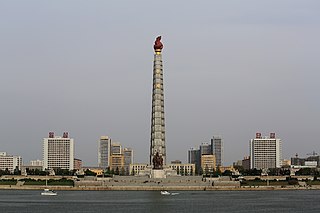
Ten Principles for the Establishment of a Monolithic Ideological System are a set of ten principles and sixty-five clauses establishing standards for governance and guiding the behaviors of the people of North Korea. First published in 1974, the Ten Principles mandate absolute loyalty and obedience to the ideas of Kim Il Sung, and later his successor Kim Jong Il, establishing them as the country's supreme political authorities.
The history of the Workers' Party of Korea (WPK) encompasses the period from 1949 onwards.

The 1st Congress of the Workers' Party of North Korea (WPNK) was held in Pyongyang, North Korea, from 28 to 30 August 1946, and established the Workers' Party of North Korea. The congress is the highest organ of the party, and is stipulated to be held every four years. A total of 801 delegates represented the party's 336,399 members. The 1st Central Committee, elected by the congress, elected Kim Tu-bong as WPNK Chairman, Kim Il Sung and Chu Yong-ha as deputy chairmen.

The 4th Congress of the Workers' Party of Korea (WPK), referred to by Kim Il Sung as the "Congress of Victors", was held in Pyongyang, North Korea, from 11 to 18 September 1961. The congress is the highest organ of the party, and is stipulated to be held every four years. 1,657 voting and 73 non-voting delegates represented the party's 1,311,563 members. The 4th Central Committee, elected by the congress, reelected Kim Il Sung as WPK Chairman, and a number of deputy chairmen.
Events from the year 1967 in North Korea.
Events from the year 1966 in North Korea.
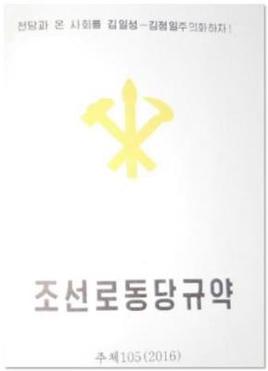
The Rules of the Workers' Party of Korea are the by-laws of the Workers' Party of Korea (WPK). It sets the rules of the organization and membership of the party. According to the rules, the WPK Congress is the highest body of the party and it, along with the WPK Conference, can amend the rules. The rules defines the character, task, and methodology of the party. According to it, the Party strives to impose communism on the whole of the Korean Peninsula. Recent revisions of the rules have defined Kimilsungism–Kimjongilism as the ideology of the party.
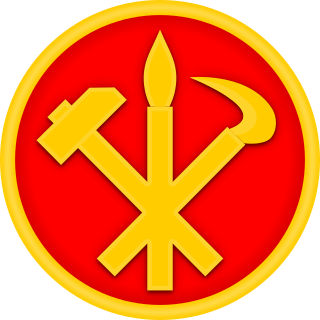
The Propaganda and Agitation Department, officially translated as the Publicity and Information Department, is a department of the Central Committee of the Workers' Party of Korea (WPK) tasked with coordinating the creation and dissemination of propaganda in North Korea. It is the highest propaganda organization in the country.
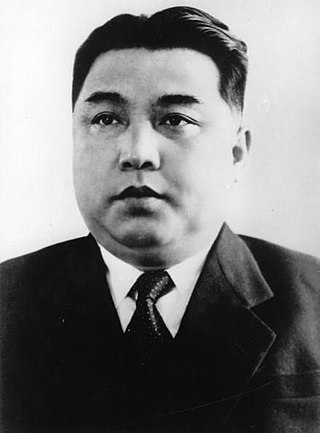
The Kapsan Faction Incident was an unsuccessful attempt to undermine the power of Kim Il Sung, the leader of North Korea, around the year 1967. The "Kapsan faction" was a group of veterans of the anti-Japanese struggle of the 1930s and 1940s that was initially close to Kim Il Sung. In the wake of the 2nd Conference of the Workers' Party of Korea (WPK) in 1966, the faction sought to introduce economic reforms, challenge Kim Il-sung's cult of personality, and appoint its ringleader Pak Kum-chol as his successor.
Pak Kum-chol was a North Korean politician. Having been a guerrilla during the anti-Japanese struggle, he became a high-ranking politician after the liberation of Korea. Pak aligned himself with his former guerrilla brothers in arms from the Kapsan Operation Committee to form a faction within the ruling Workers' Party of Korea (WPK) called the "Kapsan faction". This faction sought to replace Kim Il Sung with Pak. Kim retaliated by purging the faction in 1967 in what is known as the Kapsan Faction Incident. Pak was sent to work at a factory in the countryside and was either executed or died by suicide in May 1967.
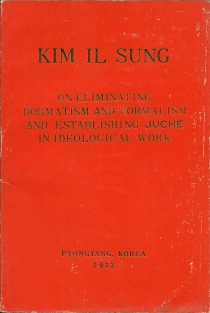
On Eliminating Dogmatism and Formalism and Establishing Juche in Ideological Work, also known as the "Juche speech", was a speech delivered on 28 December 1955 by Kim Il Sung. The address mentioned his Juche ideology by name for the first time. It is considered one of Kim's most important works and a "watershed moment" in North Korean history. Views differ if the speech used the term juche to launch an ideology or more conservatively to assert that the Korean people were the subject of the revolution. The former believes that Juche, as a distinct ideology, was developed by Hwang Jang-yop on his re-discovery of the speech. The speech was published for the first time in 1960 and in many subsequent, heavily edited revisions since.

Officially, the Workers' Party of Korea (WPK) – the ruling party of North Korea – is a communist party guided by Kimilsungism–Kimjongilism, a synthesis of the ideas of Kim Il Sung and Kim Jong Il. The party is committed to Juche, an ideology attributed to Kim Il Sung which promotes national independence and development through the efforts of the popular masses. Although Juche was originally presented as the Korean interpretation of Marxism–Leninism, the party now presents it as a freestanding philosophy. The WPK recognizes the ruling Kim family as the ultimate source of its political thought. The fourth party conference, held in 2012, amended the party rules to state that Kimilsungism–Kimjongilism was "the only guiding idea of the party". Under Kim Jong Il, who governed as chairman of the National Defence Commission, communism was steadily removed from party and state documents in favour of Songun, or military-first politics. The military, rather than the working class, was established as the base of political power. However, his successor Kim Jong Un reversed this position in 2021, replacing Songun with "people-first politics" as the party's political method and reasserting the party's commitment to communism.